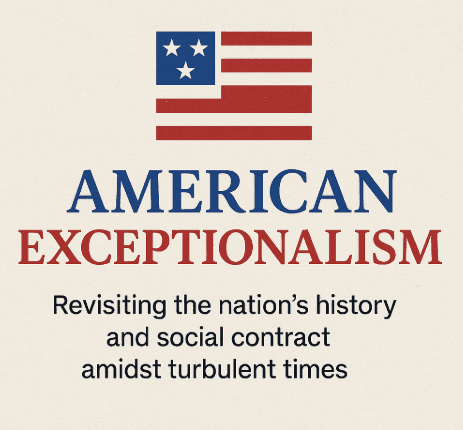
American Exceptionalism, according to Wikipedia, is the belief that the United States is distinctive, unique, or exemplary compared to other nations.[1] Proponents of the idea of American Exceptionalism also argue that the values, political system, and historical development of the U.S. are unique in human history, often with the implication that US is both destined and entitled to play a distinct and positive role on the world stage.[2]
In this editorial we attempt to highlight a couple of historical background and evolving social contracts that question the idea of American Exceptionalism. Given our current political discord, potential extreme economic chaos unleashed by tariff, and continued disregard of human suffering and injustice around the world, the validity of American exceptionalism may be put to doubt.
It is truly exceptionalism when a group of colonizers dare to claim the land they colonized as their own and succeed in establishing an exceptionally prosperous country (at least economically and politically, if not justly) that is the envy of the world. It had attracted and allowed global migration that has fueled its continued prosperity and diversity. Less known are those who suffered injustice and extreme prejudice in that exceptionalism - natives American, African American and other immigrants (including Catholics and Jews) - had to experience unpreceded racism and even extermination. African Americans, as a group, were subjected to an extreme form of slavery never seen in the world in term of its severity and systemic exploitation for free labor. The native Americans were systematically exterminated and deprived of their land and their religious uniqueness.
From a colonial historical context, every European colonial power, including Great Britain, France, Italy, Portugal, Spain, and others had never claimed (or could claim) the lands they colonized as their own and eventually were forced to leave, with several exceptions. In South Africa, the Afrikaner, who were primarily of European descent, tried to claim the land as their own and used extreme forms of Apartheid against its African natives and was forced to concede under leadership from Mandela that no such claims are valid. The other exceptions are American, already mentioned above, Australia and New Zealand.
In this not so elegant history, the enlightened founding fathers had created a democratic republic that offered unprecedented freedom to citizens, though with selectivity to white men. They did not make racism explicit in writing such as in our constitution but certainly in practice since all of them were slaveholders. However, one could say they were pragmatist, born in the existing slave practices and understood such entrenched racism can only be absolved over time and hoped that future citizens will continue to move in that direction, as evidenced by American Civil War a century later. American values for freedom of expression, academic and research excellence, industrial development are certainly exceptional, in some sense reminiscent of the unprecedented rise of Muslims and Arabs in governance, education and social justice in the Middle Ages for over a millennium. This historical context is absent or systemically de-emphasized in Western education and public sentiment in favor of American Exceptionalism.
The current political crisis, economic warfare and unjust military intervention could very well derail this American Exceptionalism unless the citizens rise to the occasion and steer this country in the direction that the founding fathers had intended. Our shared faith in God and shared conviction in human goodness also demands such activism to safeguard our country, our social fabrics, and our positive role in the world.

